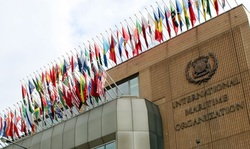IMO makes progress on sulphur cap non-compliance

The 2020 sulphur cap is 10 months away and the International Maritime Organization is vying to put in the finishing touches to the regulations over the next few months. An IMO technical body agreed last week on a set of enhancements to the implementation and enforcement. But the IMO’s political body will have to ratify them in May.
REGULATORS have made headway in their preparation for the 2020 sulphur cap, with new provisional measures for the implementation and enforcement that will have to adopted.
The International Maritime Organization’s sub-committee on pollution prevention and response last week agreed on a template for a so-called ‘fuel oil non-availability report’, known as FONAR, which crews can use in certain cases where they cannot comply with the regulation.
Operators can submit a report to flag state and port state authorities to avoid penalties for non-compliance. The report will have to demonstrate a vessel was unable to find compliant fuel.
Aside from instances of non-availability of compliant fuel, the agreed template includes the possibility that the vessel did not bunker compliant fuels due to potential “operational and safety problems on board ships”, seeking to allay persistent concerns about safety implications of the cap.
While fuel availability reports are a practical solution, there have been concerns that in the early months of the sulphur cap in particular, companies will use them excessively to avoid compliance.
The International Chamber of Shipping warned owners on Tuesday that the reports will only be a measure of last resort.
“The circumstances in which a FONAR can be used are very limited and conditions attached to their use will be strict,” ICS deputy secretary general Simon Bennett said in a statement. “Shipowners still need to remain focused on doing everything possible to ensure full compliance in 2020.”
PPR decisions do not amount to IMO policy and have to be adopted by IMO committees to do so. All PPR decisions have been forwarded to the next Marine Environment Protection Committee meeting in mid-May.
Last week’s discussions centred around technical amendments to the sulphur cap regulation and adoption of implementations guidelines.
The IMO’s PPR sub-committee further finalised a set of guidelines for the implementation of the cap, meant to assist industry and authorities to comply with and enforce the cap.
Among the panel’s most significant agreements was the establishment of a sampling point on board the vessel, where crew can draw fuel that can then be tested by authorities to verify compliance.
Much of the attention last week was given to open-loop scrubbers, with member states calling for more research on their impact on the ocean, amid increased scrutiny and regional restrictions.
PPR decided to delay agreeing on revised IMO guidelines for scrubbers by one year to 2020.